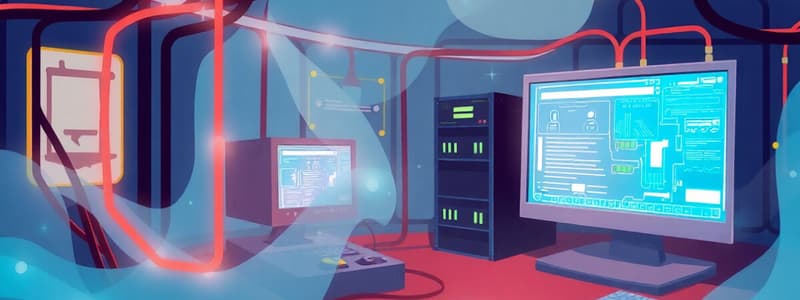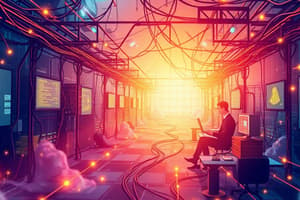Podcast
Questions and Answers
Match the following terms related to Service Level Agreements (SLAs) with their descriptions:
Match the following terms related to Service Level Agreements (SLAs) with their descriptions:
Regular maintenance visits = Scheduled check-ups for equipment upkeep Technician call outs = On-site support for faults or problems Labour costs included = No extra charges for technician work Full replacement = Equipment swap based on rental terms or warranties
Match the following types of equipment that typically require Service Level Agreements (SLAs) with their characteristics:
Match the following types of equipment that typically require Service Level Agreements (SLAs) with their characteristics:
Servers = Content management and data storage Switches = Network traffic management devices Routers = Directing data packets across networks Laser printers = High-quality printing solutions
Match the elements of a Service Level Agreement (SLA) with their purpose:
Match the elements of a Service Level Agreement (SLA) with their purpose:
Technician access = Ensuring skilled maintenance Parts and consumables included = No extra cost for necessary supplies Agreed period of time = Duration of service coverage Maintenance tasks = Tasks performed by trained personnel
Match the following roles and responsibilities related to SLAs with their descriptions:
Match the following roles and responsibilities related to SLAs with their descriptions:
Match the following statements about renting ICT equipment with their implications:
Match the following statements about renting ICT equipment with their implications:
What is the primary purpose of a Service Level Agreement (SLA) in relation to rented ICT equipment?
What is the primary purpose of a Service Level Agreement (SLA) in relation to rented ICT equipment?
Which of the following is NOT typically included in a Service Level Agreement (SLA)?
Which of the following is NOT typically included in a Service Level Agreement (SLA)?
For which type of ICT equipment is a Service Level Agreement (SLA) most commonly required?
For which type of ICT equipment is a Service Level Agreement (SLA) most commonly required?
Who is typically responsible for performing maintenance tasks covered under an SLA?
Who is typically responsible for performing maintenance tasks covered under an SLA?
What is a common financial aspect of Service Level Agreements (SLAs) related to maintenance?
What is a common financial aspect of Service Level Agreements (SLAs) related to maintenance?
Flashcards are hidden until you start studying
Study Notes
Service Level Agreements (SLAs)
- SLAs are common when organisations purchase or rent ICT equipment.
- SLAs provide access to trained technicians for maintenance.
- SLAs are often required for high-end equipment like large network laser printers.
- The SLA is part of a rental agreement and ensures proper maintenance.
- Some organisations pay a fee for an SLA on specific ICT equipment.
- Network devices like servers, switches, routers, hubs, and larger network peripherals (laser printers) typically have SLAs.
- An SLA typically includes: regular maintenance visits, technician call outs for faults, labour costs, parts and consumables, and full replacement based on rental agreement or warranties.
- SLAs ensure that all maintenance tasks are performed by authorised and trained technicians.
Service Level Agreements (SLAs)
- Organizations often purchase or rent ICT equipment with an SLA.
- SLAs ensure access to trained technicians for maintenance over an agreed period.
- SLAs are frequently required for high-end equipment like large network printers.
- SLAs are an integral part of rental agreements, guaranteeing proper maintenance.
- Some organizations pay fees for SLAs on specific ICT equipment, such as servers, switches, routers, hubs, and large peripherals.
- Common SLA inclusions:
- Regular maintenance visits.
- Technician call-outs for faults.
- Labor costs.
- Parts and consumables.
- Full replacement based on rental agreements or warranties.
- Individuals responsible for maintaining ICT equipment need to know which equipment is covered by an SLA.
- All maintenance tasks under an SLA are performed by authorized and trained technicians.
Studying That Suits You
Use AI to generate personalized quizzes and flashcards to suit your learning preferences.




